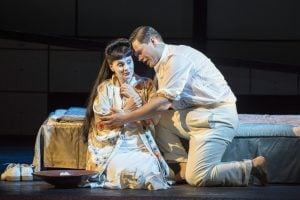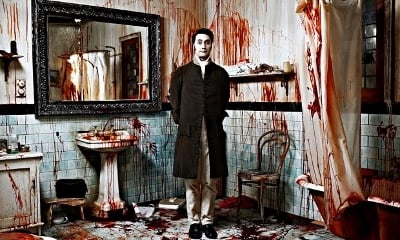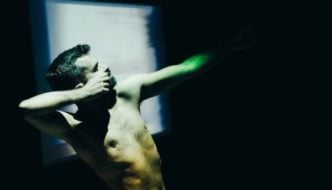
Tim Albery’s 1950s update of Puccini’s Madama Butterfly has been reliable box-office hit for Opera North for a decade now. This is its third run in that time. Further, we have heard three of the four principals – Anne Sophie Duprels’ Butterfly, Ann Taylor’s Suzuki and Peter Savidge’s Sharpless – in all previous stagings for the company. Only the Lieutenant Pinkerton has changed over the years.
As Pinkerton, Lithuanian-born Merũnas Vitulskis cannot quite claim the same appeal as his predecessors, Rafael Rojas in 2007 and Noah Stuart in 2011. His acting skills are not the equal of theirs and he lacks the vocal vitality and strength to match the orchestra’s full-blooded climaxes in Puccini’s opulent and vivid scoring. Nevertheless, he scores best where he needs to, that is, in the tender love duet that closes Act I. It is only here that Puccini imbues his character with any measure of true sympathy, providing him with his one good tune of the night by which he can redeem himself in the audience’s eyes.
The character of Butterfly is perhaps Puccini’s single most successful portrait. The innocent 15-year-old, marrying through necessity to find herself a niche in the world, shows the steely resolve to defy her family’s wishes and adopt both her new Western husband’s religion and culture. By Act II, having been abandoned for three years, she has, in the meantime, run a home and raised a child. Anne Sophie Duprels displays all the nuanced acquiescence and anguish that is needed to engage us in the ups and downs in Butterfly’s fortunes. The simple, but highly effective lullaby by which she rocks the child to sleep – ending quietly and touchingly on a high B! – is beautifully done. The most emotionally-telling scene of the evening is her manic, self-delusional triumphalism when the harbour cannon announces the return of Pinkerton’s ship and she makes frantic preparations for their reunion.
Suzuki does not have much by way of solo lines to herself, but Ann Taylor is suitably graceful in her exchanges with Pinkerton and the Consul, Sharpless, as they finally arrive at the house, and darkens her tone impressively when she realises that they have come for the child.
Puccini had had his imagination fired first of all by the Madame Butterfly story whilst attending a performance of a stage production by the American playwright David Belasco in London in 1900. What he heard he could not understand, because his English was too poor for him to make adequate sense of the dialogue, but what he saw was the actress Evelyn Millard, in the title role, hold the audience spellbound for fully fourteen minutes of complete silence as she played out the all-night vigil of waiting for Pinkerton. This hazardous, experimental coup de théâtre was aided only by a concerted depiction in the stage lighting marking the gradual progress from close of evening to break of day.
In the opera, Peter Mumford’s lighting has the advantage of musical accompaniment: a humming chorus off-stage, followed by bird calls and an almost Straussian orchestral depiction of the dawn chorus. Though it can sometimes seem like an awkward break in the action, in this present production, this too is highly effective. At about eight minutes in total, it is much more reasonable than the fourteen of a century ago. Elsewhere, the direction of maestro Martin Pickard can lapse into disappointing doggedness occasionally, but, doubtless, this will become more responsive as the run progresses.
Hildegard Bechtler’s sets blends authentic Japanese sliding shoji screens and IKEA drawer units and proves to be basic, yet perfectly serviceable for both Acts.
Madama Butterfly remains a work of unquestioned genius and a wonderful piece by way of introducing anyone to Opera.
The performance is sung in Italian with English surtitles. Running until March 2018.
Filed under: Music, Theatre & Dance
Tagged with: leeds, leeds grand theatre, Madama Butterfly, opera, opera north, review, theatre



Comments